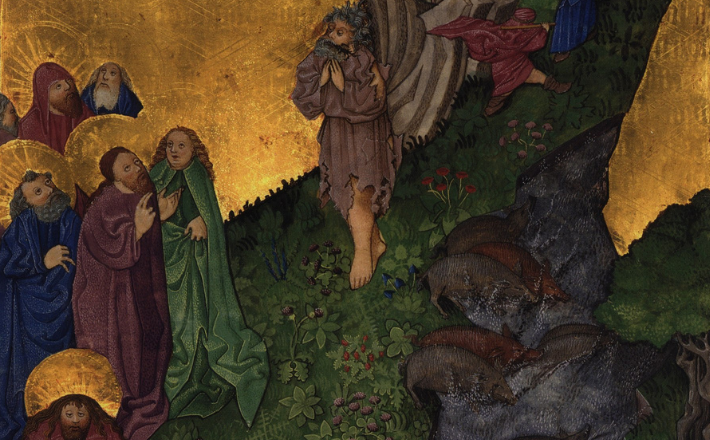Commentary on Isaiah 65:1-9
One of my favorite aspects of the prophets in general, and Isaiah specifically, is the emotional self-revelation of God. Isaiah 65 is the last turn in an ongoing emotional conversation about loss, betrayal, longing, and unresolved hurt among God, returning exiles, and the people of the land. It is not abusing a metaphor to say that the final chapters of Isaiah should be read as a father and son who have struggled with each other for decades.
After trials and difficulties, their relationship has weathered much abuse and estrangement. The father and adult child are finally in the therapist’s office, describing their own experiences using “I” language so that the other partner can hear the emotional difficulty. But the therapist (or Bible reader) can also hear the deep commitment on both sides to maintain the relationship.
Before we can turn to Isaiah 65:1–9, we must read Isaiah 63:7–14, and 63:15–64:12. These two sections form a sort of nostalgic love poem from the people toward God, and then present a confession of bad past behavior with a plea for God to reengage a people who have been set aside. In thinking about these chapters as a dialogue between father and adult child who are desperately trying to overcome distance, the opening gambit of the returned exiles is both vulnerable and cunning. They seek to remind God why and how they became family in the first place, to rekindle parental affection.
For He said, “Certainly they are My people,
Sons who will not deal falsely.”
So He became their Savior.
In all their distress He was distressed,
And the angel of His presence saved them;
In His love and in His mercy He redeemed them,
And He lifted them and carried them all the days of old.
(Isaiah 63:8–9, New American Standard Bible)
God, remember you loved us, and how you carried us when we were little! After attempting to remind God of the original affection, the people beg for the kind of relationship they want to have. “Where are your zeal and your mighty deeds?” (63:15). “You are our father!” (63:16; 64:8). Why don’t you save us and take care of us like you used to? Sure, we sinned against you some, but your neglect is the real problem, Dad!
It is against this line of thinking that God responds in Isaiah 65. God’s claim agrees with the Israelites’ poem and initial descriptions of their relationship. Of course God sought out the Israelites, spreading divine arms to embrace a beloved people (65:2). But God heaps doubt on the sincerity of the returned exiles’ claim that it is God who has grown distant. God characterizes the people, and their ancestors, as never truly asking for God, never truly seeking the divine Father. In a poignant description of unrequited parental affection, God repeats, “Here I am, here I am!” to a child who does not care, and is not looking for their father in the first place (65:2).
Not only are the children of Israel not looking for God as parent, though that would be betrayal enough; instead, they are looking for guidance from other potential parents. There is no filial loyalty here. Instead, the kids are going to family meals in other houses! They make sacrifices—share food—with gods and goddesses in gardens. They spend the night in graveyards, hoping for a familiar spirit or an ancestor to come and give them wisdom, inspiration, and power. And we can feel the sense of betrayal when God tells them they are eating food that God raised them not to eat!
After a brief time in London, I learned to drink tea with milk and a bit of honey. I’ll never forget my dad looking at me pouring milk in my tea after church one Sunday. The look on his face would have been the same if I showed up for a Bears game in a Packers jersey and a tutu. It was partially betrayal, and partially just weird. I imagined him saying, “Who taught you that? Is black coffee not good enough for you anymore?”
The Israelites responded to God much as I had to my dad: Keep your preferences to yourself. I am holier/more sophisticated than you (Isaiah 65:5). God’s response makes sense at being repudiated by flippant, disloyal children. It is like acrid smoke in God’s nostrils, and like an offense carved into God’s retina, so that it is the only thing God can see. This is the precise moment we expect the therapy session to explode into shouting, tossed pillows, and angry walkouts. The people have made a claim against God’s neglect. God has made a counter-claim against the people’s hubris, disloyalty, and indifference. Now we expect an explosion of anger. But that is exactly what doesn’t happen.
Instead, God steps back and, as any good therapist would suggest, evaluates the relationship to see if it is worth saving. God sees that the children of Israel are like a sometimes-disappointing vineyard. But the grapes this year are overflowing with tirosh—the lightly fermented oozing that comes out of cut, but not yet pressed grapes. This is like a bonus pre-harvest of wine.
Rashi, the great 11th-century sage, says that the returned exiles here are like Noah in his generation, preventing the coming destruction. Noah was not so righteous in himself—it is not such a prize to be “outstanding in his generation” in the Worst. Generation. Ever. Instead, Noah found grace in God’s eyes (Genesis 6:8). In the same way, the sweetness of this generation of returned exiles is found in God’s gracious eyes. Instead of blowing up and walking away, God considers God’s children with love and grace that both God and Israel knew was the key to their relationship all the way along.
God’s words in closing this section are the words of a loving, but sometimes distant Father, reunited with sometimes-wayward, sometimes-clingy children. I will take care of you. I will give you a space where we can be together. You will inherit good from me. (65:9). As anyone who has maintained a faith-life across decades knows, there are rough patches. But the God of the returned exiles is our God as well. Despite hurts and betrayals, God longs for our embrace and offers us open divine arms.


June 22, 2025